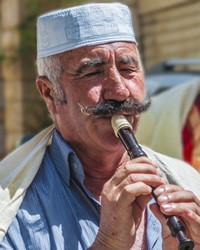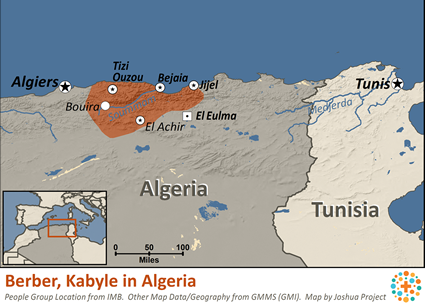The Kabyle are Berbers located in the coastal mountain regions of northern Algeria. The Arabs call this entire region of North Africa "Maghrib." The Maghrib was conquered by the Muslims between 670 and 700. "Berber" comes from an Arabic name for the aboriginal people west and south of Egypt.
The Kabyle live in the rugged, well-watered al-Quabail Mountains. These inaccessible peaks have long served as a refuge for the Berbers, forming a base of resistance against the Romans, Vandals, Byzantine, and Arabs. The mountains, some rising about 7,000 feet, are well watered. However, the landscape remains rugged. Migration is becoming more common among the Berbers, and it is estimated that several million Berbers now live in European cities.
In general, the Kabyle are sturdy, independent, lovers of the soil, thrifty, and hospitable. They can walk long distances over the mountains with little fatigue. They are proud, shrewd, persistent, and loyal. A passion for independence is deeply ingrained in their culture.
Most Kabyle are shepherds and orchard farmers. They are careful workers and have developed an extensive terracing system on the steep mountain slopes making the most of the available terrain. Their staple crops are grains and fruits.
The Kabyle traditionally live in hilltop villages. Their homes are built of stones and have red tiled roofs, and each dwelling includes a stable and a living area. There is plenty of water in some areas; however, in some places, the women must travel long distances to obtain it. They must carry heavy water jars uphill over steep, rugged donkey paths.
Their agriculture-based economy is giving way to small industries involving textiles and pottery. Their efforts to earn a better living through crafts has been enhanced by monies coming from the Kabyle diaspora in Europe.
Other Kabyle have left their mark in Algeria in music, the theater arts, literature and science. There are many Kabyle who are involved with politics since they are concerned about maintaining Berber autonomy and culture.
The Kabyle believe in preserving the family. Even when a family member is forced by economic or social reasons to migrate to cities in Northern Africa or Europe, family ties remain strong. Family unity is further strengthened in their marriage customs and inheritance rights. Often times, an entire family lives in one small hut, sharing everything. The father is the head of the family, and the family ancestry is traced through the males. According to tradition, a local assembly, which is made up of the heads of all families, governs the villages.
Those living in Algerian cities often wear western style suit jackets along with their traditional attire. The women wear long, flowing, ornamented dresses with colorful head coverings. The older women may wear tattoos on their foreheads after having their first male heir.
There are Kabyle Berber Christ followers in Europe, but very few in Algeria.
Almost all Algerians are Muslim, but they do not strictly observe the laws of the Koran. Upon converting to Islam, the Kabyle kept many of their traditional beliefs, especially that of pre-Islamic saint worship. However, they celebrate the usual Muslim holidays and visit friends and neighbors during these festive times. Weddings are lengthy celebrations that often last several days.
After Algeria's independence, Christian missionaries were expelled from that country in several waves. The remaining missionary efforts have deteriorated since that time. In spite of this, many Kabyle are searching for answers beyond Muslim fundamentalism. A number have responded to recent Christian programs produced in France.
The New Testament is available in their language, as is the JESUS Film and some Christian radio broadcasts. However, the stronghold of Islam must first be broken through prayer before this people can be reached with the gospel.
Ask the Lord to call loving people who are willing to go to Algeria and share the gospel with the Kabyle.
Ask God to use the Kabyle believers to share the love of Jesus with others in Algeria, be they Arab or Berber.
Ask the Holy Spirit to soften the hearts of the Kabyle toward the ways of Jesus Christ.
Pray that God will open the hearts of Algeria's governmental leaders to the gospel.
Ask the Lord to raise up strong local churches among the Kabyle of Algeria.
Scripture Prayers for the Berber, Kabyle in Algeria.
https://en.wikipedia.org/wiki/Kabyle_people
https://www.britannica.com/topic/Kabyle-people
| Profile Source: Joshua Project |


























